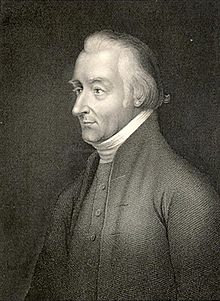Lindley Murray
| Lindley Murray | |
|---|---|
 |
|
| Born |
27 March 1745 Harper Tavern, Pennsylvania |
| Died | 16 February 1826 (aged 80) Holgate |
| Nationality | American |
| Occupation | Grammarian |
| Known for | English Grammar |
Lindley Murray (27 March 1745 – 16 February 1826), was an American Quaker who moved to England and became a writer and grammarian.
Lindley Murray was born at Harper Tavern, Pennsylvania, on 27 March 1745. His father, Robert Murray, a member of an old Quaker family, was one of the leading New York merchants. Murray was the eldest of twelve children, all of whom he survived, although he was puny and delicate in childhood. When six years old, he was sent to school in Philadelphia, but soon left to accompany his parents to North Carolina, where they lived until 1753. They then moved to New York, where Murray was sent to a good school, but proved a 'heedless boy'. Contrary to his inclinations, he was placed when only fourteen in his father's counting-house. In spite of endeavors to foster in him the commercial spirit, the lad's interests were mainly concentrated in science and literature. Collecting his books, he escaped to Burlington, New Jersey, entered a boarding-school, and started to study French. His retreat was discovered, he was brought back to New York, and allowed a private tutor. His father still desired him to apply himself to commerce, but he stated arguments in favor of a literary profession so ably in writing that his father's lawyer advised him to let the lad study law.
Four years later Murray was called to the bar, and practiced as counsel and attorney in the province of New York. At the age of twenty-two he married, and in 1770 came to England, whither his father had preceded him, but Lindley returned in 1771 to New York. Here his practice became both large and lucrative, in spite of his conscientious care to 'discourage litigation, and to recommend a peaceable settlement of differences.' On the outbreak of hostilities in America, Murray went with his wife to Long Island, where four years were spent in fishing, sailing, and shooting. On the declaration of independence he returned to New York, and was so successful that he retired in 1783 to a beautiful place on the Hudson.
As Murray's health was failing, he decided to try the English climate. In 1784, he left America and never returned. The remainder of his life was spent in literary pursuits at Holgate, near York. For the last sixteen years of his life, Murray's physical condition, likely the result of Post-Polio Syndrome, confined him to his house. Charles Monaghan's 1998 biography, The Murrays of Murray Hill, long considered a standard work, has been recently (2011) succeeded by Fens-de Zeeuw's authoritative work on Murray's life and language use, in which several earlier misconceptions are set straight.
...
Wikipedia
